【MnasNet】2019-CVPR-MnasNet: Platform-Aware Neural Architecture Search for Mobile-论文阅读
MnasNet
2019-CVPR-MnasNet: Platform-Aware Neural Architecture Search for Mobile
来源:ChenBong 博客园
- Institute:Google Brain、Google
- Author:Mingxing Tan、Quoc V. Le
- GitHub:https://github.com/tensorflow/tpu/tree/master/models/official/mnasnet
- Citation:740+
Introduction
使用 实际的 latency 和 性能acc 的 trade-off 作为搜索的目标
不是使用搜索cell,堆叠cell的单一的搜索空间,使用了新的搜索空间,允许每一个block的op类型各不相同,增加了layer的多样性
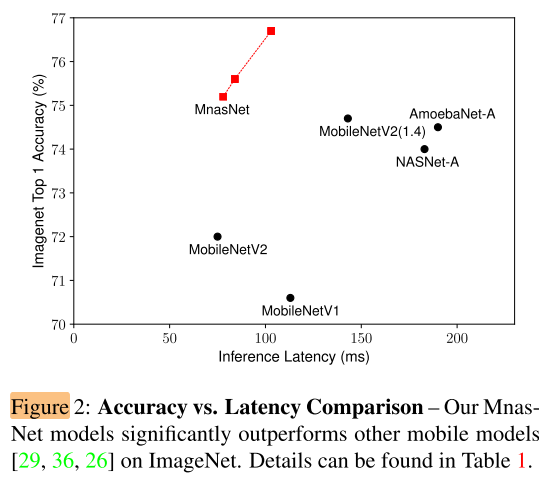
Motivation
- mobile上的网络设计,有多个优化目标,如参数量少,速度快,准确率高等
- 之前的 nas 方法在考虑 latency 时,常常使用 如 FLOPs 作为 实际 latency 的 proxy,实际上 real world latency 和 FLOPs 之间是有很大的差距的
- 之前的 nas 方法很多都是采用 搜索cell-堆叠cell 的策略,虽然这样可以减小搜索空间,但是却丢失了 layer diversity,导致搜索不到一些更好的模型
Contribution
- 同时考虑多个优化目标的 soft reward:latency and acc trade-off 的 Multi-objective soft reward
- 将 real world latency 作为优化目标
- 提出 layer diversity search space,可以实现 layer diversity
Method
Pipeline
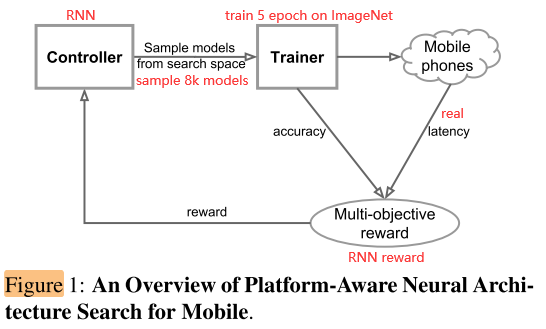
5 epoch × 8k = 40k epoch
sample 太多,采用什么搜索算法估计都没有区别,估计随机搜索性能也不差
Multi-objective Soft Reward
Hard Constraint

only maximizes a single metric and does not provide multiple Pareto optimal solutions
Soft Constraint
weight sum method:
\(maximize~ACC(m)+λ|LAT(m)-T|\)
where \(λ=\left\{\begin{array}{ll}\alpha, & \text { if } L A T(m) \leq T \\ \beta, & \text { otherwise }\end{array}\right.\)
We pick the weighted product method because it is easy to customize, but we expect methods like weighted sum should be also fine.
weight product method:
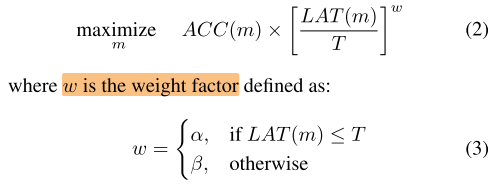
An empirical rule for picking α and β is to ensure Pareto-optimal solutions have similar reward under different accuracy-latency trade-offs.
For instance, we empirically observed doubling the latency usually brings about 5% relative accuracy gain.
Given two models:
(1) M1 has latency \(l\) and accuracy \(a\);
(2) M2 has latency \(2l\) and 5% higher accuracy \(a·(1 + 5\% )\),
they should have similar reward:
$ Reward(M2) = a · (1 + 5%)·(2l/T)^β ≈ Reward(M1) = a · (l/T)^β$.
Solving this gives β ≈ −0.07. Therefore, we use α = β = −0.07 in our experiments unless explicitly stated.
Hard Constraint vs. Soft Constraint
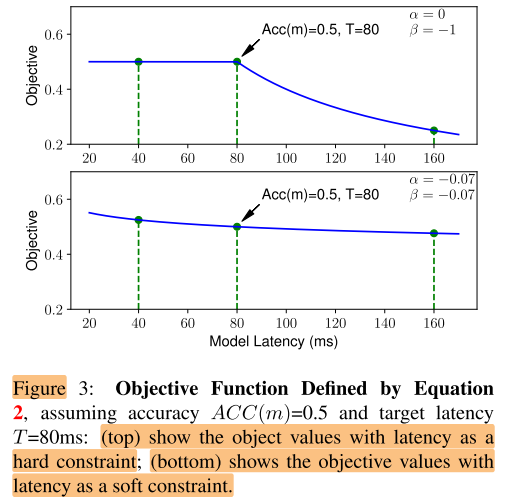
Layer Diversity Search Space
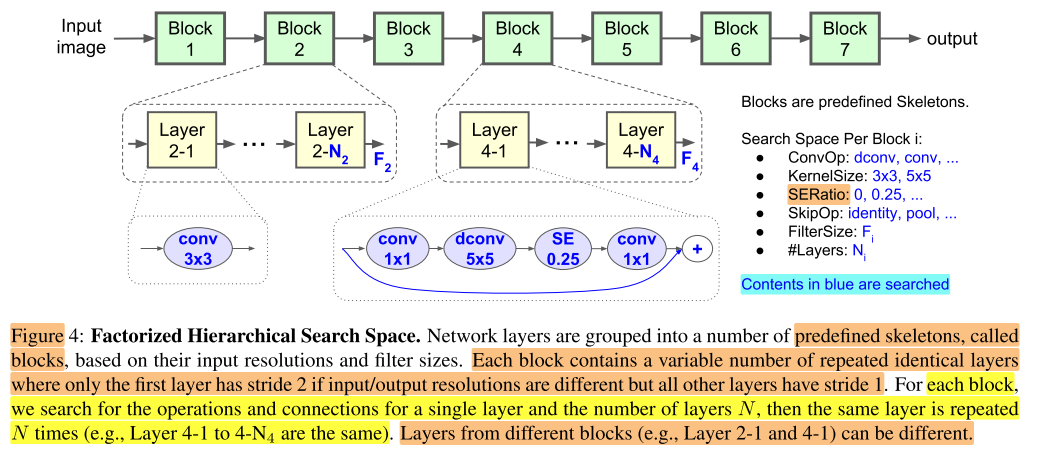
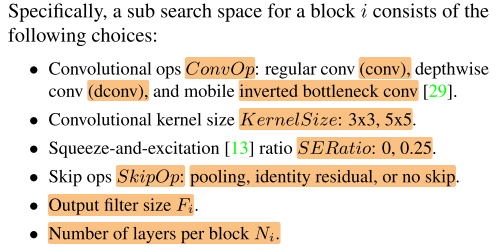
For #layers in each block, we search for {0, +1, -1} based on MobileNetV2;
for filter size per layer, we search for its relative size in {0.75, 1.0, 1.25} to MobileNetV2.
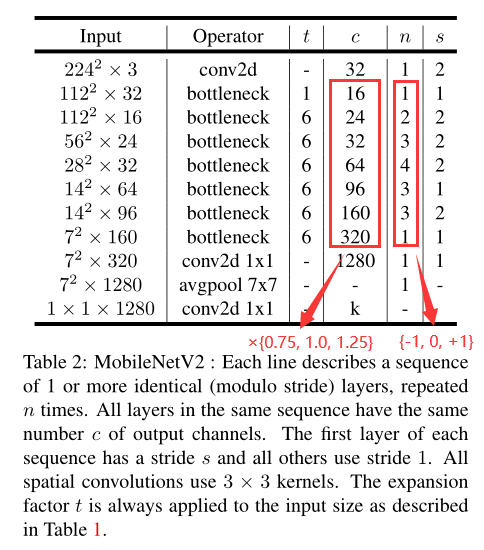
搜索空间还是基于手工设计的网络 MobileNet V2,实际上还是在搜一个类似MB V2的结构。
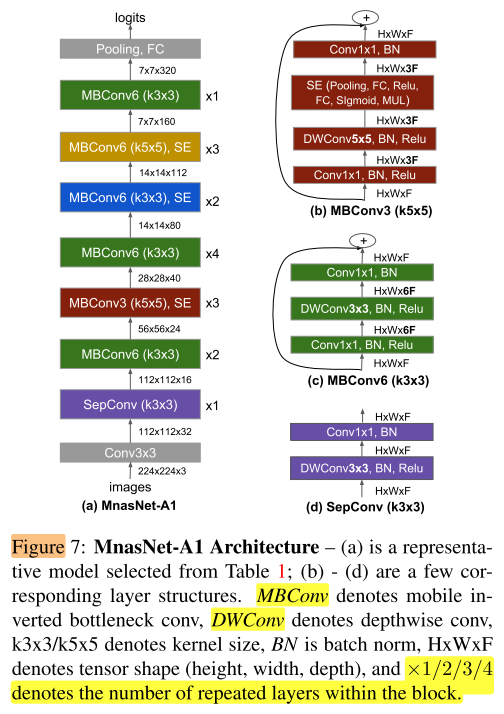
Search Algorithm
reinforcement learning approach
use sample-eval-update loop to train the controller.
Experiments
Setup
- Optimizer:RMSProp,decay=0.9,momentum=0.9
- momentum:0.99
- weight decay:1e-5
- batch size:4K
- lr:
- warm up:0 to 0.256
- decayed by 0.97 every 2.4 epochs
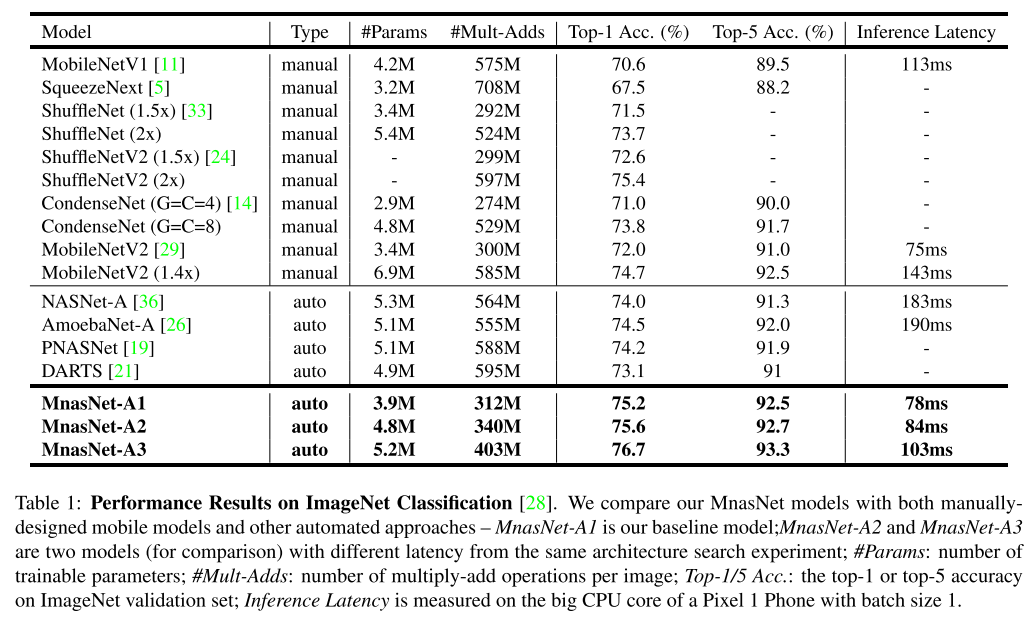
Model Scaling Performance
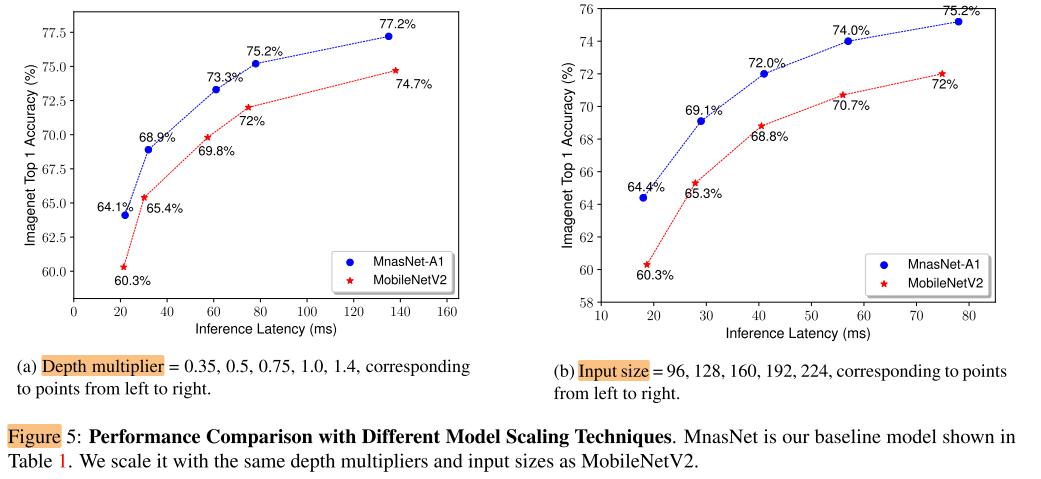
图5说明,无论是调整 Multiplier 还是 Input size,搜出来的结构都有很好的 Acc-Latency trade off。
问题:是巧合还是说明当一个结构有很好的 Acc-Latency trade off 时,在不同的scale下的表现都会一致地好?即 scale 不影响不同结构 scale 之后的 rank?
Ablation Study
Soft vs. Hard Latency Constraint
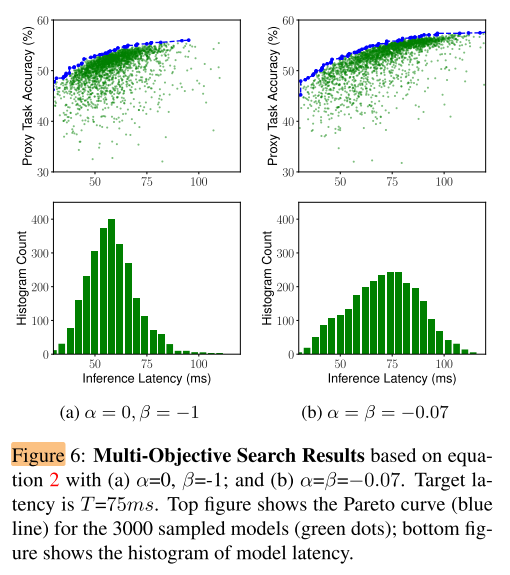
图6说明,hard constraint 下,搜到的结构主要分布在 T=75ms 以下,而 soft constraint 有更大的概率去搜索 离约束 T=75ms 更远的模型。从而可以更好地得到 acc-latency 的 Pareto optimal 曲线。
Multi-objective Soft Reward and Layer Diversity Search Space
单一因素的影响
本文的2个主要变化: A:Multi-objective soft reward 和 B:Layer diversity search space
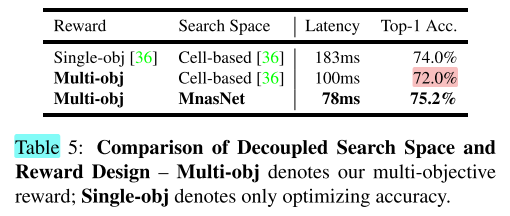
要说明 A 和 B 都有效,应要做4个实验:
A+B、A、B、baseline
得到以下形式的结果:
- A+B > A > baseline
- A+B > A
- A > baseline
- A+B > baseline
- A+B > B > baseline
- A+B > B
- B > baseline
A > baseline 和 A+B > B,说明A因素有效;B > baseline 和 A+B > A,说明B因素有效。
这里只做了A+B、A、baseline,缺了B
- A+B > A ?> baseline
- A+B > A,说明都在 A(Multi obj) 的条件下,加上更大的搜索空间 B (Layer diversity) 会更好
- A ?> baseline,不能说明仅使用 A(Multi-obj) 会更好
- A+B > baseline,同时使用 A(Multi obj) 和 B (Layer diversity)时,比 baseline 更好
- A+B > B(无) > baseline
- A+B > B,没做,不能说明在都使用 B(Layer diversity) 的条件下,有效性
- B > baseline,没做,不能说明仅使用 B(Layer diversity) 会更好
在搜到的结构上替换op
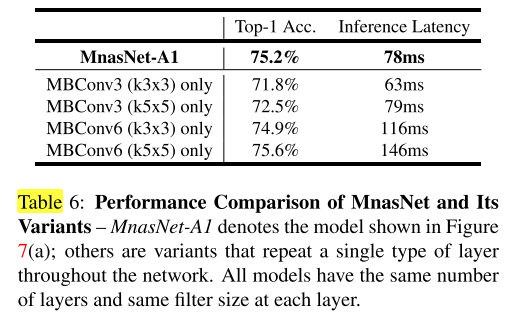
把搜到的 MnasNet-A1 不同类型的op都替换成相同类型的op,得到不同的变体,想说明 layer diversity 对acc-latency trade off 很重要。
问题:但变体不是专门在新的空间上重新搜索相同的数量,可能在单一op的空间中,也存在 acc-latency trade off 很好的模型,这个实验同样不能说明 使用 layer diversity 的 search space 会更好。
Conclusion
Summary
- 搜索算法不是本文的主要贡献
- Multi-objective soft constraint
- 对 Multi-objective 做 weight product 的形式比较少见,可以更好地探索 constraint 附近的空间,在需要找 pareto optimal 曲线的时候可以尝试
- Layer diversity Search Space:
- 问题:无论是单一因素的实验还是替换op的实验,都没有充分证明Layer diversity Search Space的有效性
- 在ImageNet 上 40k 个epoch 的开销,计算成本高


 浙公网安备 33010602011771号
浙公网安备 33010602011771号